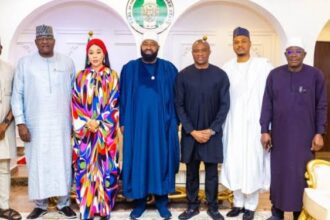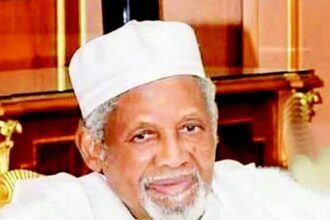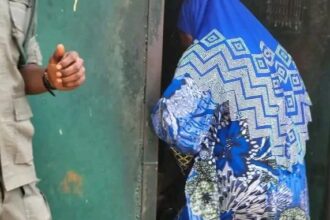...To get all news updates, Join our WhatsApp Group (Click Here)
Also Join our WhatsApp Channel (Click Here)
By Stephen Oronsaye.
My attention has been drawn to yet another attempt at character assassination against my person by means of false allegations in a report first published online in the Premium Times on September 15, 2014 and subsequently in some other Nigerian newspapers.
As on a previous occasion when I refused to join issues with the authors and publishers of similar false allegations and reports, I would ordinarily have chosen not to dignify the targeted hateful innuendoes in the misleading report entitled: “Auditor General’s Report Indicts Ex-Head of Service, Oronsaye, For N123 billion fraud” with any response, especially since the so-called audit report has been dismissed as a work of fiction. However, since my silence is capable of being misconstrued by the reading public, it has become necessary for me to set the records straight.
While it is not in my character to enumerate the successes I recorded in the different positions I have been privileged to hold, the records clearly attest to the fact that I did my best possible to reform the pension administration of the Service while I was Head of the Civil Service of the Federation between June 2009 and November 2010.
Therefore, it is quite curious that although “the audit report” was said to cover the period 2005 to 2010, the sponsors of the report only found it convenient to focus on the period in which I was in office and even in doing so, deliberately overlooked the period during which I and my team made efforts to address the problems associated with pension administration at the time.
The online report alleged that the “audit report” which the Office of the Auditor-General for the Federation has since disclaimed, found that the pension payroll was never subject to internal audit between June 2009 and December 2010; and that over N52 billion paid out as monthly pension was not presented for internal and federal audits for prepayment audit as required by Nigerian financial regulation (sic).
In actual fact, I worked closely with the Internal Auditor in the Office of the Head of the Civil Service of the Federation at the time. It was this Internal Auditor’s report that actually prompted the setting up of the Pension Reform Task Team at the time. This can be verified from the official records. As a Chartered Accountant and having served as Permanent Secretary prior to my appointment as Head of the Civil Service of the Federation, I am fully conversant with the imperatives of accountability and the implications of not applying the rules.
For the records, the major gap identified in the administration of civil service pensions when I came on board in 2009 was the lack of proper records. My team and I made far reaching efforts to address this shortcoming through the physical verification and biometric capture of civilian pensioners across the 36 States of the Federation and the Federal Capital Territory (FCT) who retired from the Service before July 1, 2007.
Through that exercise, the Office of the Head of the Civil Service of the Federation identified and eliminated no fewer than 70,000 (seventy thousand) fake/ghost pensioners from the pension payroll. To my credit and that of my team, and the relief of pensioners, 34,432 (thirty four thousand, four hundred and thirty two) pensioners who had hitherto never been paid their pension at the time, were enrolled and paid their pension as well as the arrears of their harmonized pension. In addition, under my watch, the Federal Government made a monthly saving of about N1 Billion.
Perhaps if the sponsors of the report were not so lazy, they would have dug out the letters I did to the then National Security Adviser (NSA) on December 10, 2009 (Ref: HCSF/061/S.1/III/250) and November 8, 2010 (Ref: HCSF/061/S.1/VI/53) drawing the attention of the NSA on both occasions and requesting for investigations into unclaimed pension benefits that were hitherto fraudulently paid into certain bank accounts.
In like manner, I wrote to the then EFCC Chairman in November 2010 vide letter reference HCSF/061/S.1/VI/54, forwarding four spiral-bound documents containing the names of different categories of supposed pensioners and the banks to which the funds were hitherto paid. The document was put together by the then Director, Pension Department in the Office of the Head of the Civil Service of the Federation.
In that letter, I drew the attention of the EFCC Chairman to the fact that “prior to the introduction of the integrated e-payment, pension benefits were paid to banks and all the payments were supposedly claimed by the bona fide beneficiaries. However, with the introduction of the integrated e-payment system, no one had come forward to claim the pensions that were hitherto paid to the banks for onward payment to the pensioners.” I therefore requested the EFCC to cause an investigation to be made into the matter with a view to resolving all the issues and prosecuting all those found culpable.
In another related matter, I had cause to write to the Central Bank of Nigeria (CBN) in August 2010 (Ref: HCSF/061/S.1/V/81), forwarding a 561-page record containing names and account numbers of 11,732 persons alleged to be fake pensioners but who were paid pension in their names for the month of May 2010, through banks stated. Again, I requested for an examination of the banks to ascertain how the funds were applied.
Contrary to claims that over N52 billion paid as monthly pension during my tenure remained largely unaccounted for, I actually ensured transparency in the administration of pension through the biometric measure mentioned above among others. The full report of the Pension Task Team, which was released after I had left office in 2010 would clarify this position.
It is also uncharitable for anyone to concoct a report suggesting that as Head of the Civil Service of the Federation, I oversaw an era of corruption in pension administration to the low level of receiving kick-backs totaling N1.03 billion from the Nigerian Union of Pensioners (NUP). It is on record that I repeatedly faulted the NUP for deducting check-off dues from its members, contrary to the provisions of the Constitution of the Federal Republic of Nigeria and in fact wrote to the Attorney-General of the Federation and Minister of Justice to reverse the unconstitutional trend at the time.
It is news to me that N700 million was paid to 223 contractors for store items. Throughout the 16 months during which I served as Head of the Civil Service of the Federation, I largely avoided involvement in procurement issues. The Tenders’ Board handled all issues of procurement and it was chaired by the Permanent Secretary. The only instance I got involved in a procurement was as a result of a direct intervention for the purpose of ensuring a smooth pension process and that particular procurement was less than N80 million.
In its effort to taint my image, the online report further alleged that the sum of N15 billion released by the Federal Government for the settlement of the death benefits of deceased civil servants in July 2010 could not be accounted for, adding that the money was moved to an illegal account in Union Bank and personally operated by our client. The report went on to claim that 58 Bank accounts were opened at my instance between 2009 and 2010 without the knowledge and approval of the Accountant-General of the Federation. To crown it all, it further alleged that “over N54 Billion was transferred to these illegal accounts and eventually withdrawn for undisclosed purposes”.
Again, for the records, the said N15 billion released by the Federal Government was NEVER touched during my tenure as Head of the Civil Service of the Federation because as at the time of my retirement in November 2010, the pension harmonization process had not been concluded.
In fact, the then CBN Deputy Governor (Operations), in response to the enquiry cited in paragraph 13 above, furnished the Office of the Head of the Civil Service with lists of pension accounts maintained with 15 Banks vide letters Ref: GOV/DGO/CON/CBN/01 dated August 25, 26 and 30, 2010 and September 1, 2010. The returns made by the Deposit Money Banks to the CBN at the time indicate that the Office of the Head of the Civil Service of the Federation did not operate up to 58 accounts all of which were opened prior to my assumption of office as Head of the Civil Service of the Federation.
For the records, contrary to the claims contained in the sinister report, the OHCSF during my tenure only operated 17 accounts out of the existing accounts in 12 different banks. These accounts were later consolidated into not more than seven. The assertion in the online report is therefore not tenable.
Furthermore, the OHCSF during my tenure established the electronic Pension Management Platform (EPMS) to check and facilitate transparent pension management. In addition, the office at the time carried out a nation-wide biometric enrolment of pensioners, which involved officials from the Economic and Financial Crimes Commission (EFCC), the Independent Corrupt Practices and Other Related Offences Commission (ICPC), the Department of State Services and other relevant security agencies. It was this exercise that uncovered the thousands of fake pensioners on the payroll at the time.
Indeed it was during that period that cases of fraud in the administration of pension were uncovered and they were still being investigated as at the time I retired in November 2010. I therefore find it an epic distortion of facts to allege that my tenure was characterised by fraud when what I did was to address the challenge I met on ground.
It is rather telling that in obvious disregard of the facts, the online report was silent on what transpired during the Senate’s Public hearing on alleged fraud in the administration of civil service and police pensions in 2011, during which all those who gave evidence absolved me of any act of complicity.
While I bear no grudge against anyone seeking to probe my tenure as Head of the Civil Service of the Federation or indeed any other position I have held, I find it preposterous for any individual or group of persons to be so hell-bent on maliciously and falsely discrediting my genuine contributions to the development of the country.
It is not far-fetched in the circumstances to observe that the grouse of the sponsors of these false reports against me arose from their resentment to my sincere efforts at reforms that will bring about lasting change to a system that was bedeviled by the flaws I exposed. The Principal actors in the administration of civil service pensions between 2005 and 2010, the period covered by the alleged “audit report” are still alive! It would therefore have made for more balanced reporting if the Premium Times and other newspapers had made efforts to investigate the truth instead of being led blindly to attempt to tarnish a hard-earned reputation.
For the records, I am a Chartered Accountant with decades of audit experience, a former Permanent Secretary, State House and the Federal Ministry of Finance as well as the Head of the Civil Service of the Federation, and now the Chairman, Financial Action Task Force (FATF). Through my years of practice, I have been guided by my firm belief in due process and accountability.
By normal Federal auditing procedure, where an audit has been carried out, audit observations made are forwarded to the auditee/entity for a comment/response. Ideally, those in office are expected to comment on audit observations regarding an entity. However, if they are unable to comment/respond then the proper procedure is for the observations to be passed on to those that were in the office covered by the audit, provided the persons are alive. I can confirm that no one has reached out to me in that regard.
In the desperate bid to ridicule me, the author of the Premium Times report made a rather uninformed attempt at suggesting that my Chairmanship of the Presidential Committee on Financial Action Task Force (FATF) attracts pecuniary benefits. The records are clear and they confirm that no member receives stipends or sitting allowance. The membership of the Presidential Committee on FATF, which comprises relevant Government agencies, has remained the same since 2004, except in cases where the officers have changed desks.
In the light of the foregoing, I would advise Premium Times and the media houses that published their jaundiced report to desist from reckless and malicious distortion of facts and the making of unfounded allegations designed to tarnish my reputation. I am not unmindful of the consequences of these acts and will take whatever steps may be required in defence of my name.
You can get every of our news as soon as they drop on WhatsApp ...To get all news updates, Join our WhatsApp Group (Click Here)
Also Join our WhatsApp Channel (Click Here)









